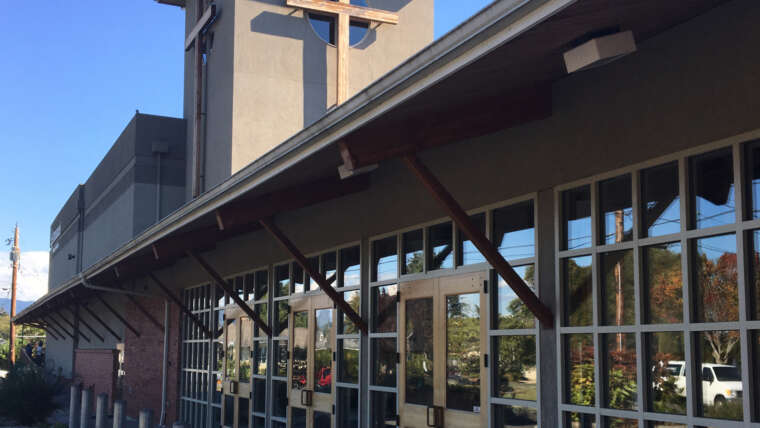
This is part four in a series on “worship.” Previous posts answer: Who do Christians worship?, Why do Christians worship?, and When do Christians worship? Today, we answer the question “Where do Christians worship?”
The question of the Samaritan woman for Jesus was, in part, a question of location: “Our fathers worshiped in this mountain, and you people say that in Jerusalem is the place where men ought to worship” (John 4:20). (Translation = “We non-Jews believe that God has given us the law and that Mount Gerizim, not Jerusalem, is where true worship occurs.”) For the Samaritan and the Jew, the question over the “right” temple went back farther than the “Do you let your baby cry it out?” debate. Jesus reveals that a time is coming (His death and resurrection) “when neither in this mountain nor in Jerusalem will you worship the Father” (John 4:21). Temples no longer function as ground-zero for worship of the Triune God. Jesus put the point under His exclamation mark with a torn temple curtain (Matthew 27:51) and a leveling of the temple so complete that “not one stone will be left upon another” (Mark 13:2).
Christians now worship the Lord anywhere. Consider Paul. Paul had the original “Damascus Road” experience. It turned him into a true worshiper because forevermore He came to God through Christ. Paul could worship from a prison cell (Acts 16:25), a Jewish synagogue (Acts 17:2), the Areopagus (Acts 17:19), a plank in the Mediterranean Sea (Acts 27:42-44), and a campfire (Acts 28:2—don’t get too serene…a viper “fastened itself on his hand.” He survived.) The point is that wherever the believer goes, it is from there that he/she may worship God. In Christ, the temple system is fulfilled. Indwelt by His Spirit, we can worship from any point on the compass!
Christians worship the Lord together. God commands us: “Let us not give up meeting together, as some of you are in the habit of doing, but let us encourage one another—and all the more as you see the Day approaching” (Hebrews 10:25). To fulfill this command, Christians gather in local assemblies, in local “bodies” (a term derived from Paul’s description of the believer’s visible attachment to the invisible “body of Christ” in Romans 12:4-5). It is in these regular worship gatherings that we also find the opportunities to fulfill the “one anothers” of the New Testament. There are fifty-nine of these commands, depending on how you count them, and most of them cannot be obeyed apart from a local church. Examples include “bearing with one another” (Ephesians 4:2), “serve one another” (Galatians 5:13), and “wait for one another” (to take Communion, 1 Corinthians 11:33). Since there is no category for “churchless Christians” in the New Testament, it is vital that we “encourage one another” to continue to meet and joyfully welcome the approach of “the Day”—not as scattered sheep, but as a unified flock, worshiping the Lord together.
Christians worship everywhere and somewhere. Our Lord Jesus fulfilled the Law and gave us His Spirit. Praise God we can worship Him anywhere. (Yes, really, praise Him right now; you don’t need to report to the sanctuary.) The Lord has also instructed us to meet in a place. Not because it is impossible to worship Him without it, but because His plan for our worship includes a corporate aspect. He calls His people together to encourage our faith in a world that seeks to discourage it while apart.


